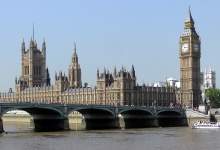

On Friday the UK Conservative party defied polls to win a general election that was largely predicted to result in a hung parliament.

Discover B2B Marketing That Performs
Combine business intelligence and editorial excellence to reach engaged professionals across 36 leading media platforms.
As a result, former coalition partners the Liberal Democrats are out of Downing Street, taking former Department of Energy and Climate Change (DECC) Secretary of State Ed Davey with them.
It’s still early days for the fledgling Conservative majority government, but from the party’s manifesto and new DECC appointment, what should cleantech companies expect?
Amber Rudd: the UK’s new Energy and Climate Change Minister
The first change by the new government, announced on Monday, was the promotion of former energy minister Amber Rudd to Secretary of State for Energy and Climate Change.
For many cleantech start-ups and companies, Rudd’s appointment will come as a relief. She is not a climate change sceptic, as some Tories are known to be, and she has openly supported the need for climate change mitigation. In 2014 she told Business Green she had no problem standing up to Tory climate change sceptics: “The first world leader to speak about climate change at the UN was Margaret Thatcher…If I’m challenged on it by any of my own party – although I haven’t been – I would say ‘I’m a Thatcherite – aren’t you?'”

US Tariffs are shifting - will you react or anticipate?
Don’t let policy changes catch you off guard. Stay proactive with real-time data and expert analysis.
By GlobalDataIt’s also thought her previous employment working in private sector banks and with venture capitalists will stand her in good stead when it comes to understanding the complexities of the green energy economy.
However, it remains to be seen whether government climate change policy will come from the Treasury or DECC itself, where Rudd will have more influence.
Davey was generally well liked by the green energy industry and helped secure a strong fourth carbon budget and over £7bn of funding for clean energy through to 2020, so Rudd has big shoes to fill.
Farewell, new onshore wind farms
Onshore wind farms will not fare well under a Conservative majority government. As the party’s 2015 manifesto clearly states: “We will end any new public subsidy and change the law so local people have the final say on wind farm applications.”
In April, RenewableUK’s Chief Executive Maria McCaffery expounded the benefits of onshore wind with a new report in an attempt to sway the Conservatives, saying: “The British onshore wind energy industry is adding over £900 million a year to the national economy, so the benefits to the UK are clear to see. This report also shows that £7 of every £10 spent on onshore wind projects is invested here in the UK.”
However, as a key Conservative energy policy, the government is unlikely to do a U-turn on this particular issue, not least because it was designed to be popular with many of the constituents who voted for them. This means it’s possible there will be no new onshore wind farms given the go-ahead throughout this government’s term, but this will depend on how quickly the government implement this policy.
EU referendum
The Conservatives have promised to hold a referendum on the UK’s membership of the EU and it looks certain this will go ahead; though a date has not yet been set. However, it has been speculated the referendum could take place as early as next year or at the latest in 2017.
It’s no secret that business leaders – including those of energy companies – are against a referendum as it will cause economic uncertainty for an extended period of time and could affect or delay future investments. If Britain were to come out of the EU it could greatly affect trade deals with its closest neighbours.
Scottish National Party leader Nicola Sturgeon has also said that any disagreement between Scotland and the rest of the UK over EU membership would increase pressure for another vote on Scottish independence, creating further market uncertainty.
Cameron says he has already started “making calls” about renegotiating Britain’s relationship with the EU.
Shale gas
David Cameron and his party has been a big proponent of shale gas, promising to push through approval for shale gas projects and offer sweeteners to communities in a bid to quell local opposition. This will see more money diverted away from green energy to the more polluting shale gas. However, the same outcome would have been expected if a Labour government had won a majority.
Hinkley Point and the fate of UK nuclear
In 2013 the coalition government approved the first nuclear power plant in the UK for 20 years, Hinkley Point C. In the party’s manifesto most references to nuclear is to Trident and nuclear weapons, however it does say the Conservatives’ plan is to “secure clean but affordable energy supplies for generations to come” via “a significant expansion in new nuclear and gas” but it fails to go into detail about how the party would achieve this.
Considering the approval of Hinkley Point C has been marred with criticism (and pending legal action by anti-nuclear Austria) due to the amount of state aid provided to the project, and in recent weeks the project has been criticised as having serious design flaws, which could further put its future in doubt, it would be surprising if another project on the scale of Hinkley was approved during the government’s five-year term, especially in the face of public unease and some scientists’ opposition to nuclear post-Fukushima.


.gif)



